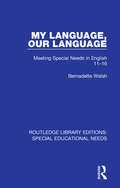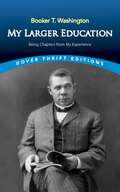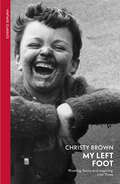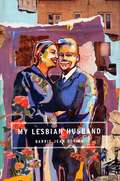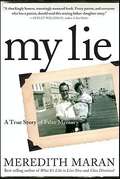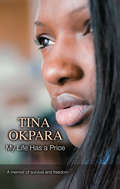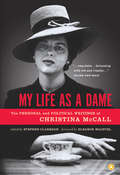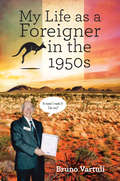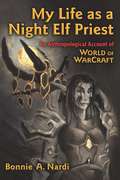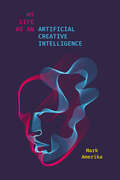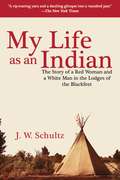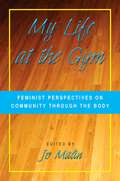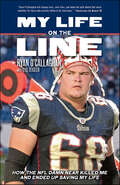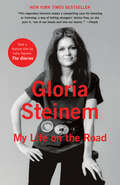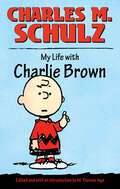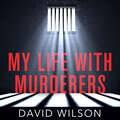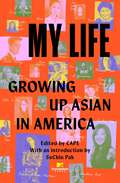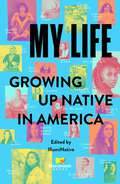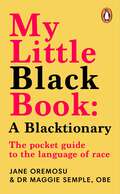- Table View
- List View
My Language, Our Language: Meeting Special Needs in English 11-16 (Routledge Library Editions: Special Educational Needs #59)
by Bernadette WalshOriginally published in 1989. Drawing on extensive teaching and research experience, Bernadette Walsh provides a practical approach to teaching pupils with language learning difficulties in the secondary school. Many of these pupils enter secondary school believing themselves to be failures in all areas because of their inability to express themselves in words. Walsh emphasises that learning difficulties of this sort often stem from emotional problems and can only be overcome by establishing warm teacher-pupil relationships based on trust and mutual acceptance and fostered by the spoken language. The book is based around the teacher’s diary which Bernadette Walsh kept as a daily record of her work in the classroom. This vivid and immediate account lends weight to her argument that only an arts-based curriculum involving poetry, story, drama, dance, art, and – above all – talk, can help the development of children with special educational needs. Student teachers will find this text a compelling and realistic introduction to a challenging area of their future profession.
My Larger Education: Being Chapters from My Experience (Dover Thrift Editions: Black History)
by Booker T. WashingtonThe primary voice of the African American community from 1890 to 1915, and the author of Up from Slavery, Booker T. Washington was an educator and orator as well as a founder of the Alabama school that developed into Tuskegee University. Washington proposed that most African Americans would benefit from a practical trade rather than a liberal arts education—a position opposed by other black leaders, including W. E. B. Dubois, and the source of a debate that lingers to this day. In this autobiographical work, Washington discusses how he arrived at his views on race relations, focusing on the importance of cooperation and teamwork and describing the experiences that led to the founding of Tuskegee. My Larger Education is essential reading for anyone wishing to learn more about Washington and his ideas as well as those seeking insights into the challenges faced by African Americans at the turn of the twentieth century.
My Left Foot: The Life That Inspired My Left Foot
by Christy BrownChristy Brown was born a victim of cerebral palsy. But the hapless, lolling baby concealed the brilliantly imaginative and sensitive mind of a writer who would take his place among the giants of Irish literature. This is Christy Brown's own story. He recounts his childhood struggle to learn to read, write, paint and finally type, with the toe of his left foot. In this manner he wrote his bestseller Down all the Days.
My Lesbian Husband
by Barrie Jean BorichBarrie Jean Borich's memoir of her 14-year marriage is a subtle exploration of gender and the intricacies of butch-femme desire. My Lesbian Husband describes Borich's attraction to her partner, Linnea, and the slow building of their life together in a decaying neighborhood in Minneapolis. Borich traces both the pleasures and the wrenching difficulties of trying to construct a long-term union in the absence not only of legal and social but of everything that our aunts and uncles and parents take for granted: "names for their union in every language, the weddings of a square-chested prince and a big-busted, cinch-waisted princess at the end of every Disney movie, every Shakespeare comedy, not to Mary and Joseph, Hera and Zeus, and those little bride and groom figurines they have saved from their wedding cakes." This is as sharply observed and well-written a memoir as Jan Clausen's and Oranges, but a valentine rather than a valediction.
My Lesbian Husband: Landscapes of a Marriage
by Barrie Jean Borich"In My Lesbian Husband, Barrie Jean Borich asks a fascinating question: do the names we give our relationships change their meanings? Each chapter entertains an aspect of this question with prose that is spirited, artful, anything but pat. Here is an author who takes neither love nor the power of language for granted, and her book is as provocative and lively as the love it evokes. An extraordinary performance by a writer who renews our wonder at the complexity of human connection."—Bernard Cooper"Barrie Jean Borich wins my respect with her ingenious and original description of feelings which, for many, need translating into a familiar language. She writes about her lover and their life together with a rare deftness, clarity, and antic sense of humor, never strident or defensive, rather self-confident and as if she herself were curious to discover what she is thinking about their relationship."—Rosellen Brown
My Lie
by Meredith MaranMeredith Maran lived a daughter's nightmare: she accused her father of sexual abuse, then realized, nearly too late, that he was innocent. During the 1980s and 1990s, tens of thousands of Americans became convinced that they had repressed memories of childhood sexual abuse, and then, decades later, recovered those memories in therapy. Journalist, mother, and daughter Meredith Maran was one of them. Her accusation and estrangement from her father caused her sons to grow up without their only grandfather, divided her family into those who believed her and those who didn't, and led her to isolate herself on "Planet Incest," where "survivors" devoted their lives, and life savings, to recovering memories of events that had never occurred. Maran unveils her family's devastation and ultimate redemption against the backdrop of the sex-abuse scandals, beginning with the infamous McMartin preschool trial, that sent hundreds of innocents to jail-several of whom remain imprisoned today. Exploring the psychological, cultural, and neuroscientific causes of this modern American witch-hunt, My Lie asks: how could so many people come to believe the same lie at the same time? What has neuroscience discovered about the brain's capacity to create false memories and encode false beliefs? What are the "big lies" gaining traction in American culture today-and how can we keep them from taking hold? My Lie is a wrenchingly honest, unexpectedly witty, and profoundly human story that proves the personal is indeed political-and the political can become painfully personal.
My Life As a Traitor: A Story of Courage and Survival in Tehran's Brutal Evin Prison
by Zarah Ghahramani Robert HillmanAt the age of twenty, an Iranian student named Zarah Ghahramani was swept off the streets of Tehran and taken to the notorious Evin prison, where criminals and political dissidents were held side by side in conditions of legendary brutality. Her crime, she asserts, was in wanting to slide back her headscarf to feel the sun on a few inches of her hair. That modest desire led her to a political activism fueled by the fearless idealism of the young. Her parents begged her to be prudent, but even they could not have imagined the horrors she faced in prison. She underwent psychological and physical torture, hanging on to sanity by scratching messages to fellow prisoners on the latrine door. She fought despair by recalling her idyllic childhood in a sprawling and affectionate family that prized tolerance and freedom of thought. After a show trial, Ghahramani was driven deep into the desert outside Tehran, uncertain if she was to be executed or freed. There she was abandoned to begin the long walk back to reclaim herself. In prose of astonishing dignity and force, Ghahramani recounts the ways in which power seduces and deforms. A richly textured memoir that celebrates a triumph of the individual over the state, My Life as a Traitor is an affecting addition to the literature of struggle and dissent.
My Life Has a Price: A Memoir of Survival and Freedom
by Tina Okpara Julie Jodter Cyril Guinet"My Life Has a Price is a sad beautiful story. I asked everybody here to read it.~ Nawal El-Saadawi, author of Woman at Point Zero (Zed Books, 1975) and God Dies by Nile (Zed Books, 1974) etc."A testament to the best and worst of humanity. You can't help but read My Life Has a Price and pass it on" .~ Sefi Atta, author of Everything Good Will Come (Swallow, 2010). "A chance at a better life should never be overlooked, but occasionally something foul lurks under opportunity...a read to be very much considered for international memoir collections". The Midwest Book Review, Library Bookwatch, Nov. 2012. One morning on the outskirts of Lagos, Nigeria, a lucky 13-year-old girl named Tina, from a modest family, is preparing to go to France to become part of Linda and Godwin Okpara's family. Linda is a homemaker and Godwin is a soccer player at the top French club Paris Saint-Germain, as well as for the Super Eagles, Nigeria's national squad. The couple have four children and Tina dreams of going with them to school and joining in their games, living the European dream. But, soon after her arrival, the reality becomes different. Written in collaboration with acclaimed French journalist, Cyril Guinet, Tina Okpara recounts how imprisonment, torture, and abuse - in a suburban house in the middle of gentrified Europe in the 21st century - could not break her. Tina's gripping story of survival and escape to rebuild her life is a moving testament to a remarkable woman, a true survivor.
My Life as a Dame: The Personal and Political Writings of Christina McCall
by Christina McCallIn February 1956, a remarkable young woman named Christina McCall began her working life as an editorial secretary at Maclean's magazine. It was a legendary time there, when the likes of Pierre Berton, Robert Fulford, June Callwood, Peter Gzowski, and Peter C. Newman graced the magazine's pages. McCall would come to join that illustrious group, and be considered not only one of the best political writers of her generation, but a pioneer for women in journalism and one of Canada's most brilliant minds. For the first time, the best of McCall's articles and essays have been collected in one definitive volume alongside excerpts from her unfinished memoirs. Covering topics from the Alberta oil boom to the rise of divorce rates in Canada to in-depth profiles of the Ottawa establishment, McCall's clear-eyed observations are not only laced with insight, humour, and compassion, they continue to be relevant today.
My Life as a Foreigner in the 1950s
by Bruno VartuliAs a young man in Italy's Southern Calabria, Bruno Vartuli dreamed of starting a new life in a new land. On his arrival in Australia in the 1950s Bruno struggled to understand the language and culture, but with tremendous strength and perseverance he overcame each adversity and achieved amazing results. This personal story of assimilation and integration highlights the importance of equality in society and inspires us to embrace the differences between people with dignity and compassion.
My Life as a Male Anorexic
by Michael KrasnowMy Life as a Male Anorexic is a uniquely male point of view of anorexia nervosa. It is the autobiographical account of a young man’s ongoing struggle with anorexia. Michael shared his story as part of the featured health segment “Men Dying to be Thin” on WSVN Channel 7 News in Miami, Florida, in May 1997.Michael Krasnow has had anorexia since 1984, and he chronicles his daily struggles, feelings, and experiences in this book. He writes in a relaxed, easygoing manner that makes the book appealing to all readers. While ignoring statistics and not pretending to be an expert on the disorder, Michael simply tells readers what his life is like and how anorexia has affected--even controlled--it. As of today, Michael has maintained his weight at 75 pounds on a 5-foot, 9-inch frame.Anyone who suffers, or anyone who knows someone who suffers from, anorexia will learn that male anorexia is a serious problem and that there needs to be psychological and medical help for the boys and men who struggle with anorexia. As Michael begins his book, “For years, anorexia existed, but very few people knew of it. Women who suffered from it did not realize that they were not alone. Eventually, as more became known and anorexia became more publicized, a greater number of women came forward to seek help, no longer feeling that they would be considered strange or outcasts from society. Maybe with the publication of this book, more men with the problem will realize that they are not alone either, and that they do not suffer from a ‘woman’s disease.’They can come forward without worrying about embarrassment.”Michael’s story will baffle, frustrate, sadden, and irritate readers, whether they are interested in the human side of Michael’s story, whether they are workers in the medical field--psychologists, psychiatrists, doctors, nurses, aides, social workers, mental health counselors--or whether they are teachers, coworkers, friends, or relatives of a male with anorexia. My Life as a Male Anorexic begins to shed light on the little-known or discussed problem of male anorexia nervosa.
My Life as a Night Elf Priest
by Bonnie A. NardiWorld of Warcraft rapidly became one of the most popular online world games on the planet, amassing 11.5 million subscribers—officially making it an online community of gamers that had more inhabitants than the state of Ohio and was almost twice as populous as Scotland. It's a massively multiplayer online game, or MMO in gamer jargon, where each person controls a single character inside a virtual world, interacting with other people's characters and computer-controlled monsters, quest-givers, and merchants. In My Life as a Night Elf Priest, Bonnie Nardi, a well-known ethnographer who has published extensively on how theories of what we do intersect with how we adopt and use technology, compiles more than three years of participatory research in Warcraft play and culture in the United States and China into this field study of player behavior and activity. She introduces us to her research strategy and the history, structure, and culture of Warcraft; argues for applying activity theory and theories of aesthetic experience to the study of gaming and play; and educates us on issues of gender, culture, and addiction as part of the play experience. Nardi paints a compelling portrait of what drives online gamers both in this country and in China, where she spent a month studying players in Internet cafes. Bonnie Nardi has given us a fresh look not only at World of Warcraft but at the field of game studies as a whole. One of the first in-depth studies of a game that has become an icon of digital culture, My Life as a Night Elf Priest will capture the interest of both the gamer and the ethnographer.
My Life as a Spy: Investigations in a Secret Police File
by Katherine VerderyAs Katherine Verdery observes, "There's nothing like reading your secret police file to make you wonder who you really are." In 1973 Verdery began her doctoral fieldwork in the Transylvanian region of Romania, ruled at the time by communist dictator Nicolae Ceausescu. She returned several times over the next twenty-five years, during which time the secret police—the Securitate—compiled a massive surveillance file on her. Reading through its 2,781 pages, she learned that she was "actually" a spy, a CIA agent, a Hungarian agitator, and a friend of dissidents: in short, an enemy of Romania. In My Life as a Spy she analyzes her file alongside her original field notes and conversations with Securitate officers. Verdery also talks with some of the informers who were close friends, learning the complex circumstances that led them to report on her, and considers how fieldwork and spying can be easily confused. Part memoir, part detective story, part anthropological analysis, My Life as a Spy offers a personal account of how government surveillance worked during the Cold War and how Verdery experienced living under it.
My Life as an Artificial Creative Intelligence (Sensing Media: Aesthetics, Philosophy, and Cultures of Media)
by Mark AmerikaA series of intellectual provocations that investigate the creative process across the human-nonhuman spectrum. Is it possible that creative artists have more in common with machines than we might think? Employing an improvisational call-and-response writing performance coauthored with an AI text generator, remix artist and scholar Mark Amerika, interrogates how his own "psychic automatism" is itself a nonhuman function strategically designed to reveal the poetic attributes of programmable worlds still unimagined. Through a series of intellectual provocations that investigate the creative process across the human-nonhuman spectrum, Amerika critically reflects on whether creativity itself is, at root, a nonhuman information behavior that emerges from an onto-operational presence experiencing an otherworldly aesthetic sensibility. Amerika engages with his cyberpunk imagination to simultaneously embrace and problematize human-machine collaborations. He draws from jazz performance, beatnik poetry, Buddhist thought, and surrealism to suggest that his own artificial creative intelligence operates as a finely tuned remix engine continuously training itself to build on the history of avant-garde art and writing. Playful and provocative, My Life as an Artificial Creative Intelligence flips the script on contemporary AI research that attempts to build systems that perform more like humans, instead self-reflexively making a very nontraditional argument about AI's impact on society and its relationship to the cosmos.
My Life as an Indian: The Story of a Red Woman and a White Man in the Lodges of the Blackfeet (Native American Ser.)
by J. W. SchultzA fascinating memoir of a white man who gained access to the private lives of the Blackfeet Indians. First published in 1907, My Life as an Indian is the memoir of J. W. Schultz’s life as a young white man among the Piegan Blackfeet in the Montana Territory. Inspired by the journals of Lewis and Clark and George Catlin’s depictions of Indian life in his paintings, Schultz journeyed to the American West in search of adventure and became a trapper and trader. However he stumbled into a completely new and inspiring world when he met the Blackfoot tribe, and he soon settled into their lifestyle. During his time with the Blackfeet, Schultz married a Blackfoot woman named Natahki. In this firsthand account of a life and culture that many were not privy to at the time, Schultz paints a stunning portrait of a people he admired, revered, and came to live among. He exposes elements of everyday life in the tribe’s encampments such as child rearing, food preparation, war parties, and the tanning of buffalo hides. He illuminates religious and burial ceremonies, and takes readers on the thrill of buffalo hunts and into the heart of battle against neighboring tribes. Now prefaced with a new introduction, My Life as an Indian continues to hold unsurpassable insight that makes it still relevant today. It is a memorably honest and readable portrayal of one outsider’s view of Native Americans from a time when most still regarded these remarkable people as simple savages. Skyhorse Publishing, as well as our Arcade imprint, are proud to publish a broad range of books for readers interested in history--books about World War II, the Third Reich, Hitler and his henchmen, the JFK assassination, conspiracies, the American Civil War, the American Revolution, gladiators, Vikings, ancient Rome, medieval times, the old West, and much more. While not every title we publish becomes a New York Times bestseller or a national bestseller, we are committed to books on subjects that are sometimes overlooked and to authors whose work might not otherwise find a home.
My Life at the Gym: Feminist Perspectives on Community through the Body
by Jo Malin"Very often, my workouts are the best part of my day," notes feminist writer Jo Malin. My Life at the Gym celebrates women's experiences of exercise and the found spaces for this activity as places of community with other women. Neither elite athletes nor dancers, the contributors to this volume are well aware of the negative cultural messages about women's bodies that may influence body work. Yet, like many women, they have found comfortable and healthful spaces that allow them to enjoy exercise and take care of the physical needs of their bodies. Through diverse essays, personal accounts, and poems, contributors portray everyday lives in which meaning comes from movement and from the companions they move with in a variety of activities from running, walking, swimming, and skiing to boxing, Morris dancing, and yoga, among others. A unique, positive, and largely unremarked view of exercise and its place in women's lives, this book will resonate with and inspire many readers.
My Life on the Line: How the NFL Damn Near Killed Me and Ended Up Saving My Life
by Cyd Zeigler Ryan O'CallaghanA riveting account of life as a closeted professional athlete from gay NFL player O’Callaghan, against the backdrop of depression, opioid addiction, and the threat of suicide.“[O’Callaghan’s] story is one of beautiful vulnerability, and it further shows the importance of knowing you aren’t alone.” —Oprah Daily, recommended by Gayle KingRyan O’Callaghan’s plan was always to play football and then, when his career was over, kill himself. Growing up in a politically conservative corner of California, the not-so-subtle messages he heard as a young man from his family and from TV and film routinely equated being gay with disease and death. Letting people in on the darkest secret he kept buried inside was not an option: better death with a secret than life as a gay man. As a kid , Ryan never envisioned just how far his football career would take him. He was recruited by the University of California, Berkeley, where he spent five seasons, playing alongside his friend Aaron Rodgers. Then it was on to the NFL for stints with the almost-undefeated New England Patriots and the often-defeated Kansas City Chiefs.Bubbling under the surface of Ryan’s entire NFL career was a collision course between his secret sexuality and his hidden drug use. When the league caught him smoking pot, he turned to NFL-sanctioned prescription painkillers that quickly sent his life into a tailspin. As injuries mounted and his daily intake of opioids reached a near-lethal level, he wrote his suicide note to his parents and plotted his death.Yet someone had been watching. A member of the Chiefs organization stepped in, recognizing the signs of drug addiction. Ryan reluctantly sought psychological help, and it was there that he revealed his lifelong secret for the very first time. Nearing the twilight of his career, Ryan faced the ultimate decision: end it all, or find out if his family and football friends could ever accept a gay man in their lives.
My Life on the Road
by Gloria Steinem<P>Gloria Steinem--writer, activist, organizer, and inspiring leader--now tells a story she has never told before, a candid account of her life as a traveler, a listener, and a catalyst for change. <P>When people ask me why I still have hope and energy after all these years, I always say: Because I travel. Taking to the road--by which I mean letting the road take you--changed who I thought I was. The road is messy in the way that real life is messy. It leads us out of denial and into reality, out of theory and into practice, out of caution and into action, out of statistics and into stories--in short, out of our heads and into our hearts. <P>Gloria Steinem had an itinerant childhood. When she was a young girl, her father would pack the family in the car every fall and drive across country searching for adventure and trying to make a living. The seeds were planted: Gloria realized that growing up didn't have to mean settling down. And so began a lifetime of travel, of activism and leadership, of listening to people whose voices and ideas would inspire change and revolution. <P> My Life on the Road is the moving, funny, and profound story of Gloria's growth and also the growth of a revolutionary movement for equality--and the story of how surprising encounters on the road shaped both. <P>From her first experience of social activism among women in India to her work as a journalist in the 1960s; from the whirlwind of political campaigns to the founding of Ms. magazine; from the historic 1977 National Women's Conference to her travels through Indian Country--a lifetime spent on the road allowed Gloria to listen and connect deeply with people, to understand that context is everything, and to become part of a movement that would change the world. <P> In prose that is revealing and rich, Gloria reminds us that living in an open, observant, and "on the road" state of mind can make a difference in how we learn, what we do, and how we understand each other.
My Life with Charlie Brown
by Charles M. SchulzWhile best known as the creator of Peanuts, Charles M. Schulz (1922–2000) was also a thoughtful and precise prose writer who knew how to explain his craft in clear and engaging ways. My Life with Charlie Brown brings together his major prose writings, many published here for the first time. Schulz's autobiographical articles, book introductions, magazine pieces, lectures, and commentary elucidate his life and his art, and clarify themes of modern life, philosophy, and religion that are interwoven into his beloved, groundbreaking comic strip. Edited and with an introduction by comics scholar M. Thomas Inge, this volume will serve as the touchstone for Schulz's thoughts and convictions and as a wide-ranging, unique autobiography in the absence of a traditional, extended memoir. Inge and the Schulz estate have chosen a number of illustrations to include. With the approval and cooperation of the Schulz family, Inge draws on the cartoonist's entire archives, papers, and correspondence to allow Schulz full voice to speak his mind. The project includes his comics criticism, his introductions to Peanuts volumes, his essays about philanthropy, his commentary on Christianity, his newspaper articles about the creation of his characters, and more. My Life with Charlie Brown will reveal new dimensions of this legendary cartoonist.
My Life with Murderers: Behind Bars with the World's Most Violent Men
by David WilsonBE THE FIRST TO READ DAVID WILSON'S NEW TRUE CRIME BOOK "A PLOT TO KILL" BY PRE-ORDERING NOW 'Hugely insightful and thought provoking . . . I read it from cover to cover in one go' - Emilia Fox'With characteristic brilliance and admirable sensitivity, Wilson illuminates the complex causes of their often horrific crimes' - Professor Simon Winlow, Vice President of the British Society of CriminologyProfessor David Wilson has spent his professional life working with violent men - especially men who have committed murder. Aged twenty-nine he became, at that time, the UK's youngest ever prison Governor in charge of a jail and his career since then has seen him sat across a table with all sorts of killers: sometimes in a tense interview; sometimes sharing a cup of tea (or something a little stronger); sometimes looking them in the eye to tell them that they are a psychopath.Some of these men became David's friends; others would still love to kill him. My Life with Murderers tells the story of David's journey from idealistic prison governor to expert criminologist and professor. With experience unlike any other, David's story is a fascinating and compelling study of human nature.
My Life with Murderers: Behind Bars with the World's Most Violent Men
by David Wilson'Hugely insightful and thought provoking . . . I read it from cover to cover in one go' - Emilia Fox'With characteristic brilliance and admirable sensitivity, Wilson illuminates the complex causes of their often horrific crimes' - Professor Simon Winlow, Vice President of the British Society of CriminologyProfessor David Wilson has spent his professional life working with violent men - especially men who have committed murder. Aged twenty-nine he became, at that time, the UK's youngest ever prison Governor in charge of a jail and his career since then has seen him sat across a table with all sorts of killers: sometimes in a tense interview; sometimes sharing a cup of tea (or something a little stronger); sometimes looking them in the eye to tell them that they are a psychopath.Some of these men became David's friends; others would still love to kill him. My Life with Murderers tells the story of David's journey from idealistic prison governor to expert criminologist and professor. With experience unlike any other, David's story is a fascinating and compelling study of human nature.
My Life with Things: The Consumer Diaries
by Elizabeth ChinUnconventional and provocative, My Life with Things is Elizabeth Chin's meditation on her relationship with consumer goods and a critical statement on the politics and method of anthropology. Chin centers the book on diary entries that focus on everyday items--kitchen cabinet knobs, shoes, a piano--and uses them to intimately examine the ways consumption resonates with personal and social meaning: from writing love haikus about her favorite nail polish and discussing the racial implications of her tooth cap, to revealing how she used shopping to cope with a miscarriage and contemplating how her young daughter came to think that she needed Lunesta. Throughout, Chin keeps Karl Marx and his family's relationship to their possessions in mind, drawing parallels between Marx's napkins, the production of late nineteenth-century table linens, and Chin's own vintage linen collection. Unflinchingly and refreshingly honest, Chin unlocks the complexities of her attachments to, reliance on, and complicated relationships with her things. In so doing, she prompts readers to reconsider their own consumption, as well as their assumptions about the possibilities for creative scholarship.
My Life: Growing Up Asian in America
by CapeA collection of thirty heartfelt, witty, and hopeful thought pieces &“that highlights the humanity and multitudes of being Asian American&” (Kirkus Reviews, starred review), for fans of Minor Feelings.There are 23 million people, representing more than twenty countries, each with unique languages, histories, and cultures, clumped under one banner: Asian American. Though their experiences are individual, certain commonalities appear. -The pressure to perform and the weight of the model minority myth. -The proximity to whiteness (for many) and the resulting privileges. -The desexualizing, exoticizing, and fetishizing of their bodies. -The microaggressions. -The erasure and overt racism. Through a series of essays, poems, and comics, thirty creators give voice to moments that defined them and shed light on the immense diversity and complexity of the Asian American identity. Edited by CAPE and with an introduction by renowned journalist SuChin Pak, My Life: Growing Up Asian in America is a celebration of community, a call to action, and &“a vital record of the Asian American experience&” (Publishers Weekly). It&’s the perfect gift for any occasion. Featuring contributions from bestselling authors Melissa de la Cruz, Marie Lu, and Tanaïs; journalists Amna Nawaz, Edmund Lee, and Aisha Sultan; TV and film writers Teresa Hsiao, Heather Jeng Bladt, and Nathan Ramos-Park; and industry leaders Ellen K. Pao and Aneesh Raman, among many more.
My Life: Growing Up Native in America
by IllumiNativeA moving collection of twenty powerful essays, poems, and more that capture and celebrate the modern Native American experience, featuring entries by Angeline Boulley, Madison Hammond, Kara Roselle Smith, and many more. With heart, pathos, humor, and insight, twenty renowned writers, performers, athletes, and activists explore what it means to be Native American today. Through a series of essays and poems, these luminaries give voice to their individual experiences while shedding light on the depth and complexity of modern Native American identity, resiliency, and joy. The topics are as fascinating and diverse as the creators. From Mato Wayuhi, award-winning composer of Reservation Dogs, honoring a friend who believed in his talent to New York Times bestselling author Angeline Boulley exploring what it means to feel Native enough, these entries are not only an exploration of community, they are also a call for a more just and equitable world, and a road map toward a brighter future. Edited by IllumiNative, an organization dedicated to amplifying contemporary Native voices, My Life: Growing Up Native in America features contributions from Angeline Boulley, Philip J. Deloria, Eric Gansworth, Kimberly Guerrero, Somah Haaland, Madison Hammond, Nasugraq Rainey Hopson, Trudie Jackson, Princess Daazhraii Johnson, Lady Shug, Ahsaki Baa LaFrance-Chachere, Taietsarón:sere Leclaire, Cece Meadows, Sherri Mitchell, Charlie Amaya Scott, Kara Roselle Smith, Vera Starbard, Dash Turner, Crystal Wahpepah, and Mato Wayuhi.
My Little Black Book: The pocket guide to the language of race
by Maggie Semple Jane OremosuThrough their work with organisations and companies across the world, Maggie Semple and Jane Oremosu found that there was a need to help people as they discussed difference, race and inclusion. My Little Black Book: A Blacktionary aims to do just that.This A-Z pocket guide is for people who are entering the workplace and finding their identity, for leaders and managers who feel overwhelmed by ever-evolving definitions and phrases, for anyone who is afraid of saying the wrong thing and being judged. From explaining what microagressions are and their impact, to helping you understand what cultural appreciation is and how it's different to cultural appropriation, this book will break down barriers to engaging in conversations on race.Drawing together the best definitions as well as useful advice and tips, My Little Black Book: A Blacktionary is an essential tool to broaden your knowledge and live and work better with others.
